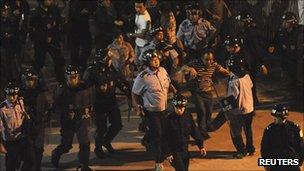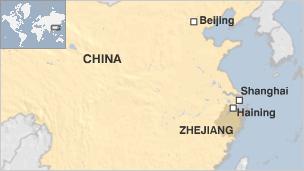China: Villagers protest at Zhejiang solar panel plant
- Published

Riot police were brought in to remove protesters from outside the solar panel factory in Haining City
Hundreds of villagers in eastern China have held three days of protests at a solar panel plant over pollution fears.
Around 500 people started gathering at Zhejiang Jinko Solar company in Haining city, Zhejiang province, on Thursday.
Some of protesters stormed the factory, overturning several company cars and destroying offices, officials said.
Residents in the nearby village of Hongxiao said they became concerned after the deaths of a large number of river fish.
One 64-year-old villager told the Associated Press that the factory - located close to a school and kindergarten - discharges waste into the river and spews dense smoke out of a dozen chimneys.
"The villagers strongly request that this factory be moved to another area," he said. "I am very worried about the health of the younger generation".
Factories closed
Four police vehicles were reportedly damaged in demonstrations on Friday, and dozens of police officers were seen being brought in to keep control of the situation.

Chen Hongming, a deputy head of Haining's environmental protection bureau, was quoted by Chinese news agency Xinhua as saying that the factory's waste disposal had failed pollution tests since April.
The environmental watchdog has warned the factory, but it had not effectively controlled the pollution, he added.
The company is a subsidiary of a New York Exchange-listed Chinese solar company, JinkoSolar Holding Company. Both firms have made no comment about the protests or pollution allegations.
In a separate incident, Shanghai on Friday ordered the temporary closure of two factories in the east of the city amid lead poisoning fears.
The Shanghai Environmental Protection Bureau said in a statement that a "small amount of children living in the Kangqiao area... were found to have excessive levels of lead in their blood in early September".
The factories affected include a large lead-acid battery plant operated by Shanghai Johnson Controls International Battery Company - a unit of the New York-listed industrial giant Johnson Controls.
Johnson Controls said it had suspended production at the site and was co-operating with the authorities, but insisted it did not believe its plant was the source of the problem.
The battery plant was named a "national model enterprise for occupational health and safety" in 2006, and has lead emissions at about one-seventh the Chinese national standard, the company said in a statement.
- Published14 August 2011
- Published8 August 2011
- Published20 July 2011